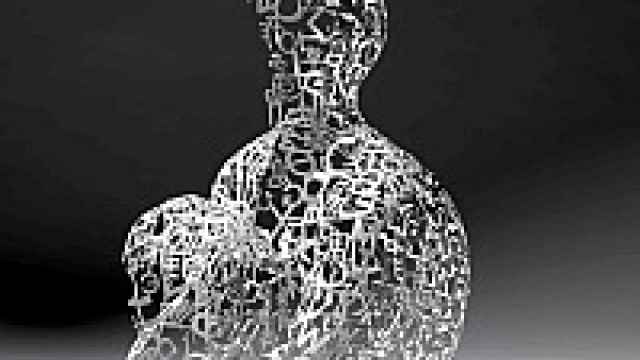Though this is Barcelona-born Plensa's first show in Russia, he has been at the vanguard of contemporary sculpture for most of the past two decades. His reputation is based on exemplary work not only in the art world, but quite literally outside it. Many of Plensa's major works, in particular the $17 million Crown Fountain that has since become a Chicago landmark, came about as public projects made to order. To mark his arrival in Moscow, Plensa has furnished the city with the breathtaking "House of Knowledge" outside the Federation Tower, an 8-meter self-portrait made entirely out of letters.
Plensa's fixation with written communication may seem odd in this most physical of media, but it is an intrinsic part of his outlook. "I grew up completely surrounded by books, and so my memories are just text," he said in an interview. "I've always felt that a text or even letters are a metaphor of our society. One person alone seems nothing, but together you can construct a society. And it's the same with letters. One letter alone means nothing, but together they become a word, with words you can compose a text, with text you can make books, culture, progressing from the smallest to the greatest."
For Plensa, the contradiction between the scale and space that sculpture involves and the vaguer implications conjured by text becomes an artistic space to explore. The apparent non sequitur of the title comes from his belief that "words and sounds are always there, even if nobody pronounces them. I always loved this idea of frozen words, the idea that something is fixed in the air. Now in Moscow when I talk, maybe my words will freeze in the air, and maybe one sunny day they will start to melt, and people passing in the street could hear me even if I'm not there anymore. I like this idea that we have a memory much wider than our souvenirs."
The exhibition gives a good overview of Plensa's diverse approach to sculpture -- what he calls his "notebook." His works are mainly self-portraits but vary in their use of letters and words. Over the course of his career, Plensa has made sculptures from literary quotations, lists of the world's longest rivers, the names of minerals and in the piece "WE," random letters from the Roman, Cyrillic and Chinese alphabets. "I have to be as wide as possible to invite you to come in, even if our origins are different," he said. "It's an exercise in communication, sending messages into bottles. But I don't know who will get the bottle at which beach. The important thing is to make a well-made bottle, to protect the message as much as possible."
 Gasull Fotografia Plena's beguiling letter sculpture. | |
Watching "House of Knowledge" below the high-rises of Moskva-City, it seems difficult to imagine the complex without it. Though it was not commissioned site-specifically, Plensa was immediately convinced that he had found his sculpture a perfect home. "In a museum, you're talking about yourself, but when you're in a public space you have to talk about a community," he said. "It keeps you completely open about different ways to resolve similar problems. It's like a breath of new life in one town."
Moscow is particularly gasping for artists like Plensa indoors and out. Visits of this caliber per year can almost be counted on one hand, and in particular it is a real shame that "House of Knowledge" will only remain at the Federation Tower until June. But if nothing else, Plensa's work will stay with the viewer long after that. "I hope that thanks to my pieces you can find your own memories," he said. "That is the beauty in sculpture, when you can produce that fantastic moment in people."
Jaume Plensa's "Silent Music" is at Diehl + Gallery One until March 15. 5/13 Smolenskaya Naberezhnaya. Metro Smolenskaya. Tel 244-0248.
A Message from The Moscow Times:
Dear readers,
We are facing unprecedented challenges. Russia's Prosecutor General's Office has designated The Moscow Times as an "undesirable" organization, criminalizing our work and putting our staff at risk of prosecution. This follows our earlier unjust labeling as a "foreign agent."
These actions are direct attempts to silence independent journalism in Russia. The authorities claim our work "discredits the decisions of the Russian leadership." We see things differently: we strive to provide accurate, unbiased reporting on Russia.
We, the journalists of The Moscow Times, refuse to be silenced. But to continue our work, we need your help.
Your support, no matter how small, makes a world of difference. If you can, please support us monthly starting from just $2. It's quick to set up, and every contribution makes a significant impact.
By supporting The Moscow Times, you're defending open, independent journalism in the face of repression. Thank you for standing with us.
Remind me later.


